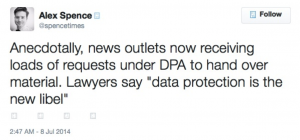“If the headline asks a question, try answering ‘no'” says Andrew Marr in My Trade (2005, p. 253).
The answer to this post’s headline, as I see it, is a bit uncertain. I ignored Betteridge’s Law and used the same question as a title for a presentation at the University of Winchester’s Conference on Trust, Risk, Information and the Law (#TRILCon15) in April 2015 because I’d seen it popping up on Twitter (for example: here and here), and a piece in the Economist describing a ‘new front’ in media law.
 The question of whether data protection is superseding defamation can’t be answered definitively because of the inadequate data on defamation and data protection. I’ve set this out in more detail in a post on the Inforrm blog and the LSE Media Policy Project.
The question of whether data protection is superseding defamation can’t be answered definitively because of the inadequate data on defamation and data protection. I’ve set this out in more detail in a post on the Inforrm blog and the LSE Media Policy Project.
In April, I answered the question with a “not yet, no”, but it is becoming (or should be) an area of increasing concern for news organisations and journalists, which will need careful scrutiny and further research.
Things are certainly changing in terms of the impact of Article 8 of the Human Rights Act and the Data Protection Act 1998 on journalism and online publishing, but I’m not convinced that either, or both, have totally overtaken libel. My research in 2011-13 indicated that libel was still the major concern and preoccupation for bloggers, journalists and media lawyers.
And defamation certainly isn’t dead. There are two interesting defamation related developments to report since I wrote that post.
The first is a case described by the Times as ‘libel tourism’, a phenomenon that better data would allow us to monitor properly (cf. this Guardian’s piece – another one with a question in the headline). Although the claimant in Sloutsker v Romanova (Rev 1) [2015] EWHC 2053 (QB) (16 July 2015) lives outside the jurisdiction and the material complained of was published on Russian websites by a journalist living in Russia, the judge “concluded that the claim involves a real and substantial tort in this jurisdiction, and that England is clearly the appropriate place in which to try the claim” [para. 12; para. 100 Sloutsker v Romanova [2015] EWHC 545 (QB) (05 March 2015)]. He awarded the claimant £110,000 in damages.
The second is not a defamation case, but a Supreme Court decision that relates to the issue of costs in privacy and defamation proceedings, since it discusses at length the ECtHR’s rejection of the pre-LASPO Conditional Fee Agreement regime in MGN v United Kingdom (Coventry & Ors v Lawrence & Anor [2015] UKSC 50 (22 July 2015)). As 5RB notes here, “by a majority of 5-2 the Supreme Court held that the pre-LASPO CFA regime, which remains applicable in a small minority of claims including privacy and publication cases, is compatible with the ECHR“. More on the UK Human Rights blog here.
